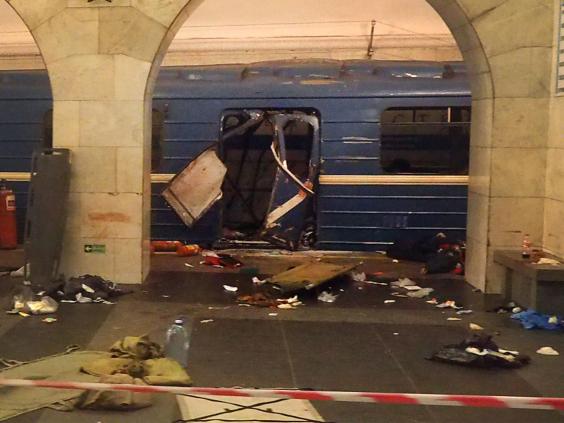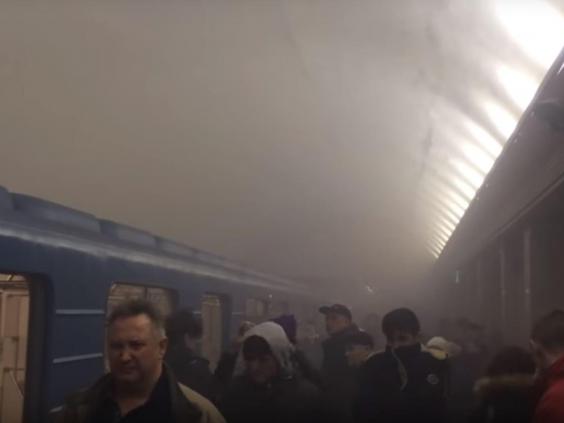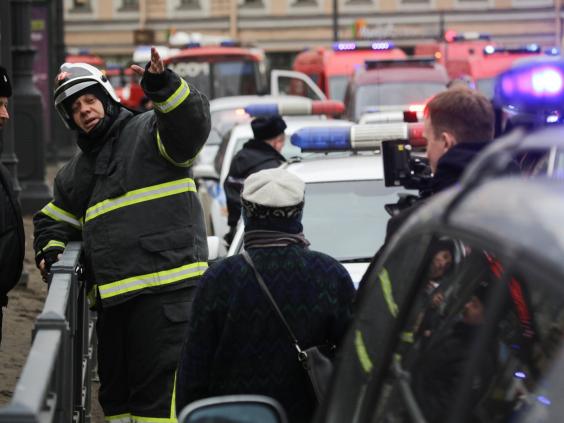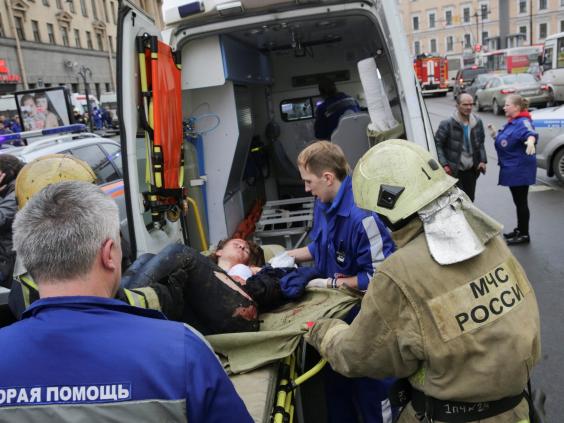
Russian police are hunting for two suspects in the wake of a bomb blast in the St Petersburg metro system that killed at least 11 people and wounded 45 more.
Law enforcement officials have said that a suicide bomber was responsible for the blast, according to reports in Russian media.
The suspected bomber is thought to have links to radical Islamists and is believed to be a 23-year-old from central Asia.
Definitive conclusions cannot be made until DNA is examined but there are reports the attacker carried the bomb in a backpack.
An unidentified explosive device went off at 2:20pm on a train after leaving Sennaya Ploshchad station and heading to the Technology Institute station, Russia's National Anti-Terrorist Committee said.
Russian security agencies found and defused a second explosive device at the Ploschad Vosstaniya station, one of the city's busiest stations, the committee also said.
Polina, who was travelling in the next carriage, told Bumaga when the train pulled into the Technology Institute station she "saw that the neighbouring carriage was mangled, window glass was broken, there was no light and there was blood."
Russia's health minister, Veronika Skvortsova, said seven people were killed immediately while another died in an ambulance and two more died in hospital. The death toll was later updated from 10 to 11.

However, further casualties were seemingly avoided after the driver made the decision not to stop the train immediately and pulled into the Technology Institute station.
This allowed for the swift evacuation of the train and the driver was praised by authorities for his quickness of thought.
After the explosion, the subway station was a terrible scene of suffering.
Anastasia, a St Petersburg student at the Technology Institute said: "I saw a young woman with a black face, she was crying and had blood on her clothes."
Another eyewitness said when smoke started pouring out of the carriages, people began to flee in panic.
“People were bleeding, their hair burned,” one man told Russian channel Life News.
“Smoke poured out of the carriages. We were told to move to the exit, because the movement stopped. People just fled. My girlfriend was in the next car that exploded.
"She said that he began to shake. When she came out, she saw that people were mutilated.”The blast came as Russian President Vladimir Putin was visiting the city, his hometown, for talks with Belarusian President Alexander Lukashenko.
He said investigators are looking into whether the explosion was a terror attack although Prime Minister Dmitry Medvedev used that exact phrase in a Facebook post.
Russia's state investigative committee said it had opened a criminal inquiry under the section of Russia's criminal code dealing with terror.
The agency, which has sweeping powers, said it had sent a group of investigators to St Petersburg, but would consider all other possible causes.
Mr Putin made this clear earlier in the day. He said: “The causes of this event have not been determined yet, so it’s too early to talk about [possible causes].
"The investigation will show. Certainly, we will consider all variants, common, criminal, first of all, of a terrorist nature."
He offered his condolences to the families of those killed in the attack.Some Russian media released CCTV images with the face of a man they said was one of the suspects, who appeared to be wearing what appeared to be a skullcap characteristic of Muslim regions in the forrmer Soviet Union.
Ambulances and fire engines descended on the scene near the centre of the former Russian imperial capital.

St. Petersburg, Russia's second-largest city with over five million residents, is the country's most popular tourist destination.
The two stations that were the site of the blast are some of the subway's busiest. Video footage posted on social media showed injured people lying bleeding on the platform, some being treated by emergency services and fellow passengers.
Others ran away from the platform amid clouds of smoke, some screaming or holding hands to their faces.
A huge hole was blasted in the side of a carriage with metal wreckage strewn across the platform. Passengers were seen hammering at the windows of one closed carriage.
Russian TV said many had suffered lacerations from glass shards and metal.
The St. Petersburg subway immediately shut down all of its stations and the national anti-terrorism body said security measures would be tightened at all key transport facilities across Russia.
A three-day mourning period was announced across the city while other countries also stepped up their security measures including France.
"I appeal to you citizens of St Petersburg and guests of our city to be alert, attentive and cautious and to behave in a responsible matter in light of events," St Petersburg Governor Georgy Poltavchenko said in an address.
Following the news coming from #SaintPetersburg, together with all EU Foreign ministers. Our thoughts are with all people of #Russia
Deepest sympathy to those affected by the #StPetersburg metro explosion, their loved ones and the Russian people.
Foreign Secretary Boris Johnson tweeted to say: "Horrified by news of explosion in St Petersburg. "My sympathies are with the victims and their families."
Nato Secretary General Jens Stoltenberg tweeted his sympathies, as did Vice-President of the EU Commission Federica Mogherini.

When asked about the blast, US Presdient Donald Trump told reporters it was a "terrible thing — happening all over the world — absolutely a terrible thing."
White House Press Secretary Sean Spicer says the US is condemning the "reprehensible" attack.
Mr Spicer said: "Our thoughts and prayers are with the injured and with the Russian people," as he offered US assistance to Russia.
Iran's Foreign Ministry Spokesman Bahram Ghasemi said killing innocent people "is the most humiliating act for achieving political goals."
UN Secretary-General Antonio Guterres said those responsible for the bombing must be held accountable.
French Foreign Minister Jean-Marc Ayrault said his nation would "stand by all those who suffer." Russia has been the target of attacks by Chechen militants in past years and Chechen rebel leaders have frequently threatened further attacks.
At least 38 people were killed in 2010 when two female suicide bombers detonated bombs on packed Moscow metro trains.
Isis, which has drawn recruits from the ranks of Chechen rebels, has also threatened attacks across Russia in retaliation for Russian military intervention in Syria.
Russian air force and special forces have been backing President Bashar al-Assad in fighting rebel groups and Isis fighters now being driven out of their Syrian strongholds.
Supporters of the terror group have celebrated the explosion, though no group has claimed responsibility.
The Foreign Office currently warns of “a high threat from terrorism” in Russia, and says “further attacks are likely."
The travel advice adds: “Although there’s no indication that British nationals or interests have been specific targets, attacks could be indiscriminate, including in places visited by foreigners."




No comments:
Post a Comment